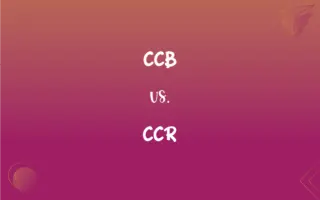Hydroxyl vs. Hydroxide: What's the Difference?
Edited by Harlon Moss || By Janet White || Published on March 1, 2024
Hydroxyl is a functional group in organic chemistry, part of many molecules, while hydroxide is an inorganic anion found in bases.

Key Differences
Hydroxyl groups consist of an oxygen atom bonded to a hydrogen atom and are part of larger molecules. Hydroxide ions also contain an oxygen and a hydrogen atom, but they carry a negative charge and exist as free ions in solution.
Hydroxyl groups are important in organic chemistry, often impacting the chemical properties of molecules like alcohols. Hydroxide ions are key in inorganic chemistry, especially in the formation of bases and their reactions with acids to form water and salts.
In molecules, hydroxyl groups can affect boiling point, solubility, and reactivity. Hydroxide ions, being charged, are always found in an aqueous environment and are responsible for the basicity of compounds.
Hydroxyl groups are found in a wide range of organic compounds, including sugars, alcohols, and acids. Hydroxide ions are commonly derived from dissociation of bases, like sodium hydroxide, in water.
Hydroxyl groups can participate in various chemical reactions, such as dehydration and oxidation. Hydroxide ions are often involved in neutralization reactions and can act as nucleophiles in chemical synthesis.
ADVERTISEMENT
Comparison Chart
Charge
Neutral
Negative
Role in Chemistry
Functional group in organic molecules
Ion in inorganic bases
Effect on Compound Properties
Affects solubility, reactivity, boiling point
Determines basicity, forms salts with acids
Examples
Alcohols, carboxylic acids
Sodium hydroxide, potassium hydroxide
Hydroxyl and Hydroxide Definitions
Hydroxyl
Hydroxyl is a functional group consisting of an oxygen and a hydrogen atom.
The hydroxyl group in ethanol contributes to its characteristic properties.
ADVERTISEMENT
Hydroxide
Hydroxide ions are key components of basic solutions.
The hydroxide ions in lime water make it an effective neutralizer for acids.
Hydroxyl
Hydroxyl is a neutral group found in various chemical compounds.
The hydroxyl group in alcohols is responsible for their reaction with acids.
Hydroxide
Hydroxide ions can act as nucleophiles in organic synthesis.
Hydroxide ions are used in the synthesis of alcohols from alkyl halides.
Hydroxyl
Hydroxyl groups are part of organic molecules, affecting their behavior.
The presence of multiple hydroxyl groups makes sugars highly soluble in water.
Hydroxide
Hydroxide compounds are commonly used in cleaning agents and detergents.
Potassium hydroxide is used in making soft soaps due to its hydroxide content.
Hydroxyl
Hydroxyl is involved in hydrogen bonding, affecting the molecule's physical properties.
Hydroxyl groups in cellulose form hydrogen bonds, giving it structural strength.
Hydroxide
Hydroxide is an anion consisting of oxygen and hydrogen with a negative charge.
Sodium hydroxide dissociates in water to form sodium ions and hydroxide ions.
Hydroxyl
Hydroxyl can be a site for chemical reactions like dehydration or oxidation.
The hydroxyl group in organic compounds can undergo oxidation to form carbonyl groups.
Hydroxide
Hydroxide is involved in neutralization reactions with acids.
Hydroxide ions react with hydrochloric acid to form water and salt.
Hydroxyl
The univalent group OH, a characteristic component of bases, certain acids, phenols, alcohols, carboxylic and sulfonic acids, and amphoteric compounds.
Hydroxide
A chemical compound, especially an ionic compound, containing a hydroxyl group.
Hydroxyl
(chemistry) A univalent radical or functional group (–OH) in organic chemistry; present in alcohols, phenols, carboxylic acids and certain other classes of compounds.
Hydroxide
(chemistry) An univalent anion (OH-) based on the hydroxyl functional group.
Hydroxyl
A compound radical, or unsaturated group, HO, consisting of one atom of hydrogen and one of oxygen. It is a characteristic part of the hydrates, the alcohols, the oxygen acids, etc.
Hydroxide
Any substance containing such an anion.
Hydroxyl
The monovalent group -OH in such compounds as bases and some acids and alcohols
Hydroxide
A hydrate; a substance containing hydrogen and oxygen, made by combining water with an oxide, and yielding water by elimination. The hydroxides are regarded as compounds of hydroxyl, united usually with basic element or radical; as, calcium hydroxide ethyl hydroxide.
Hydroxide
A compound of an oxide with water
Hydroxide
A chemical compound containing the hydroxyl group
FAQs
What is a hydroxyl group?
A hydroxyl group is a functional group consisting of an oxygen and hydrogen atom, commonly found in organic molecules.
What are hydroxide ions?
Hydroxide ions are negatively charged ions made of oxygen and hydrogen, present in basic solutions.
How does a hydroxyl group affect a molecule?
Hydroxyl groups can affect a molecule's solubility, boiling point, and chemical reactivity.
Are hydroxyl groups charged?
No, hydroxyl groups are neutral.
Do hydroxide ions have a charge?
Yes, hydroxide ions have a negative charge.
Can hydroxyl groups form hydrogen bonds?
Yes, hydroxyl groups can form hydrogen bonds, affecting the physical properties of compounds.
Where are hydroxide ions commonly found?
Hydroxide ions are found in basic aqueous solutions and are formed when bases like sodium hydroxide dissolve in water.
What happens when hydroxide ions react with acids?
When hydroxide ions react with acids, they form water and salts.
Are hydroxide compounds basic or acidic?
Hydroxide compounds are basic.
What is an example of a hydroxyl-containing organic compound?
Ethanol, an alcohol, is an example of a hydroxyl-containing organic compound.
Can hydroxide be used in industrial processes?
Yes, hydroxide ions are used in various industrial processes, including paper manufacturing and water treatment.
What is a common example of a hydroxide salt?
Sodium hydroxide (NaOH) is a common example of a hydroxide salt.
What types of compounds contain hydroxyl groups?
Compounds like alcohols, acids, and sugars contain hydroxyl groups.
What is the role of hydroxide in chemical reactions?
Hydroxide ions play a key role in neutralization reactions with acids and can act as nucleophiles in synthesis.
Are hydroxyl-containing compounds typically soluble in water?
Many hydroxyl-containing compounds are soluble in water due to the hydroxyl group's ability to form hydrogen bonds.
How do hydroxide ions affect the pH of a solution?
Hydroxide ions increase the pH of a solution, making it more basic.
How does the presence of a hydroxyl group impact a molecule's boiling point?
The presence of a hydroxyl group generally increases a molecule's boiling point due to hydrogen bonding.
Is the hydroxyl group reactive in organic synthesis?
Yes, the hydroxyl group is reactive and can participate in various organic synthesis reactions.
Can hydroxyl groups participate in chemical reactions?
Yes, hydroxyl groups can participate in various chemical reactions, including dehydration and oxidation.
What is a common use of hydroxide in everyday products?
Hydroxide is commonly used in cleaning agents, soaps, and detergents.
About Author
Written by
Janet WhiteJanet White has been an esteemed writer and blogger for Difference Wiki. Holding a Master's degree in Science and Medical Journalism from the prestigious Boston University, she has consistently demonstrated her expertise and passion for her field. When she's not immersed in her work, Janet relishes her time exercising, delving into a good book, and cherishing moments with friends and family.
Edited by
Harlon MossHarlon is a seasoned quality moderator and accomplished content writer for Difference Wiki. An alumnus of the prestigious University of California, he earned his degree in Computer Science. Leveraging his academic background, Harlon brings a meticulous and informed perspective to his work, ensuring content accuracy and excellence.







































































